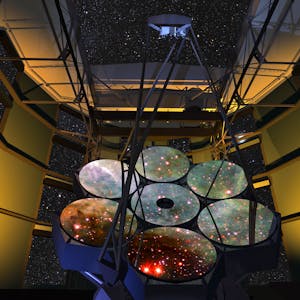Robotics Engineering & Applications
About this Course
The \"Robotics Engineering & Applications\" course stands as a beacon of innovation and opportunity in the realm of collaborative robotics. Comprising three dynamic modules, participants embark on a transformative journey delving into the essentials of robotic engineering, advanced programming techniques, and the integration of vision systems in designing and building robots for real-world applications. This course is meticulously crafted to cater to the diverse learning needs of undergraduate students of Mechanical & Mechatronics Engineering, students specializing in robotics & automation, post-graduate students of Mechanical Engineering & Computer-Aided Manufacturing Engineering, as well as practicing engineers in automation environments. At its core, the course emphasizes a hands-on approach to learning, ensuring participants are equipped with practical skills and theoretical knowledge essential for success in the field of collaborative robotics. The prerequisites of the course lay a solid foundation, covering basics on industrial manufacturing, fundamentals of introductory mechatronics, introductory electronics, and applied physics. Armed with this knowledge, participants are prepared to dive into the intricacies of robotic engineering and applications. The first module, \"Robotic Engineering Essentials,\" serves as the cornerstone of the course, providing participants with a comprehensive understanding of robotic manipulator design, gripper designs, and the fundamentals of robot programming. Participants will explore the intricacies of designing and configuring robotic systems tailored to specific industrial requirements, laying the groundwork for subsequent modules. The second module, \"Robot Programming and Vision Systems,\" delves into advanced programming techniques and the integration of vision systems in robotic applications. Participants will learn to harness the power of cameras, image processing, and object recognition techniques to enhance robot perception and decision-making capabilities. The module also explores the application of machine vision in industrial processes, equipping participants with the skills to analyze and interpret visual data for a wide range of applications. In the final module, \"Design & Robot Building and Applications,\" participants will put their newfound knowledge into practice, undertaking the challenge of designing and building their own robots for real-world applications. From conceptualization to implementation, participants will learn to navigate the intricacies of robot design, integrating components seamlessly to achieve optimal performance. Furthermore, the module explores the implementation of Industrial Internet of Things (IIoT) in robotics, empowering participants to leverage interconnected devices and sensors to enhance automation and efficiency in industrial settings. Upon completion of this course, participants will emerge with a diverse set of skill sets essential for success in the field of collaborative robotics. From robotic manipulator design to robot programming, participants will gain proficiency in designing, programming, and implementing robotic systems tailored to specific industrial requirements. Furthermore, participants will be equipped with the knowledge and expertise to integrate vision systems and IIoT technologies, revolutionizing automation and efficiency in industrial processes. In conclusion, the \"Robotics Engineering & Applications\" course offers a transformative learning experience for individuals aspiring to excel in the dynamic field of collaborative robotics. Through a blend of theoretical knowledge, practical skills, and hands-on experience, participants emerge as innovators poised to make meaningful contributions to the future of industrial automation.Created by: L&T EduTech

Related Online Courses
Currently we are only able to offer this certification program in English. This certification program is not available in a country that is considered sanctioned by the U.S.\\n\\nWelcome to Leading... more
This course is designed to help learners sell their products, goods and services to Chinese consumers. To achieve this goal, the course will use evidence-based research in psychology, economics,... more
This course is designed for anyone who is interested in learning more about modern astronomy. We will help you get up to date on the most recent astronomical discoveries while also providing... more
Dive into \'Business Foundations: Organizations, Planning, Finance\', this course is crafted to examine three critical pillars of business success. We\'ve distilled complex ideas into practical,... more
In this Specialization, you\'ll learn about managing tasks and events within a Sprint, Scrum terminology and roles, Scrum reporting, and managing risks. We\'ll discuss Story Points and User... more







